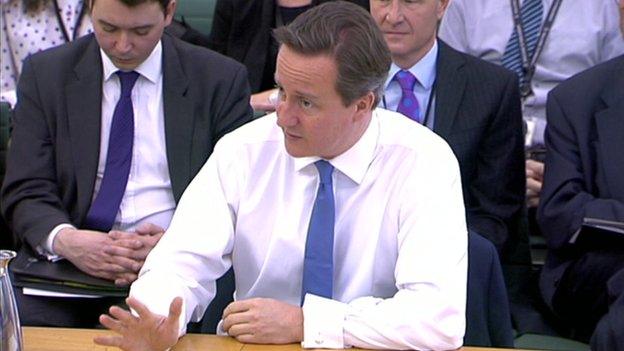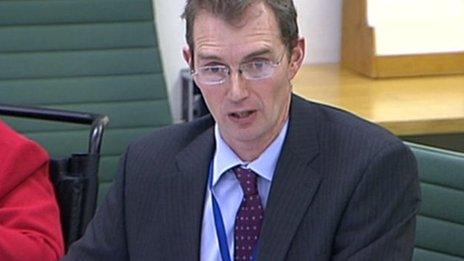That formula again: prime minister grilled on funding
- Published
- comments

Tax powers will reduce the importance of Barnett, the prime minister says
David Cameron has been facing MPs' questions on the future of devolution.
The prime minister gave evidence to MPs on the liaison committee, which is made up of the chairs of Westminster's select committees. Some of the questions - and answers - will be familiar to those of you who follow these issues carefully.
So what did we learn? David Cameron remains a "double-yes" man in terms of the Welsh government pressing ahead with a referendum to acquire some control over income tax and for a "yes" vote in that referendum.
In the wake of the "vow" to keep the Barnett formula, the prime minister said a change to the way the Welsh government is funded isn't "on the horizon".
He was responding to the Monmouth Tory MP David Davies, who chairs the Welsh affairs committee. Mr Davies said the formula was "rather out of date" and the issue of funding should be looked at in the light of the Scottish referendum on independence.

Monmouth MP David Davies says the time is right to look at funding
He said that the prime minister had previously said reform of the formula would have to wait for the stabilisation of the public finances, which were now more stable.
David Cameron said there was a lot more work to do to eradicate the deficit. He added: "If we go for this process of devolving tax-raising powers to the Scottish Parliament, the Welsh Assembly, then the importance of Barnett will reduce because obviously these institutions will have smaller block grants and larger tax bases and so the importance of Barnett will be less.
"What I've said is that I don't think reform of Barnett is on the horizon. I said that in 2013 and I stick by that. And I always say to, particularly English colleagues but also to Welsh colleagues who complain about the effect of Barnett, is I don't think there's any magic formula here of how you work out distribution between the nations of the United Kingdom."
So does this mean no change? Welsh Secretary Stephen Crabb said earlier this week that he recognised there were questions about "fair funding" for Wales. , externalHe told his audience the UK and Welsh governments have agreed to revisit "the arrangements for considering relative funding in light of the powers in the Wales Bill".
Funding is one of the issues Mr Crabb is trying to make progress on as part of his package of measures to be announced around St David's Day next year. But he also told the Institute of Welsh Affairs: "This issue of funding must not be used as either a road block to further devolution, or as an excuse for poor performance. The margin of difference we are talking about in terms of overall budget levels is tiny - between one and two percent at most."
A margin of difference so "tiny" you could be forgiven for thinking it was an easy political fix - and certainly far less costly than continuing to fund Scotland so generously. Expect to hear more on this in the House of Commons this afternoon when largely English, largely Conservative MPs lead a debate on "Devolution and the Union".